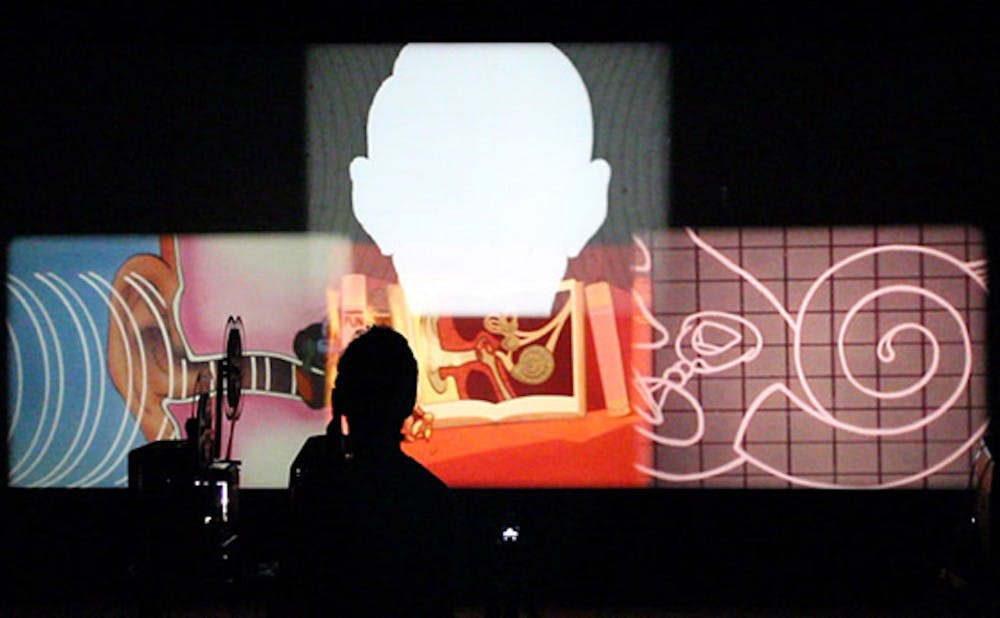Roger Beebe, who received his Ph.D. in Literature at Duke in 2000, came back to campus last Wednesday to present four of his multi-projector films at the Bryan Center’s Griffith Film Theater.
The event was part of Beebe’s 3000-mile road trip of performances. Every couple of years, Beebe takes a semester off as an associate professor at Ohio State University and travels around the country in his Prius with six 16mm projectors. He wrote in an email that he was already interested in touring before he even began to make the work that he presented at Duke.
“It seemed like an interesting way to keep my work in circulation after it ended its festival run, and it was a great way to see the world, meet new people and even earn a little, a very little, money,” Beebe wrote.
Beebe chose to stop by Duke as a part of his road trip this year because he had valuable experiences here as a former Ph.D. student.
“Duke is a place where I have a lot of memories and still know a lot of people who have been parts of my life as long as I have been a filmmaker,” Beebe said. “So it is a special place for me to return to, not just another stop on the tour.”
When Beebe contacted Hank Okazaki, a film programmer for the Screen/Society film and video exhibition program at Duke, Okazaki organized Beebe’s performance on campus. Having known Beebe for more than a decade, he appreciated Beebe’s talent as a filmmaker.
“[Beebe] was an important pillar of the local film community during his years at Duke,” Okazaki wrote in an email. “That made it a very easy decision to invite him back to his former home to showcase his recent projects.”
Toward the end of his years as an undergraduate at Amherst College, Beebe watched a diverse range of films. During a post-graduate fellowship in Paris, where he could see almost anything from all of cinematic history on the big screen, Beebe felt that continuing to make films was the logical next step.
At Duke, his coursework at the graduate program in Literature offered him the first taste of filmmaking, but Freewater Productions gave him the resources and financial support to experiment and develop his own style as a filmmaker.
Beebe uses more than one projector to create his films. He thought this technique of presenting multiple screens in the same scene added excitement to his works, which he said is especially crucial today when people are bombarded with media.
“I am interested in turning a screen into something more singular like a live concert, where you know that you are seeing a one-of-a-kind event,” Beebe wrote.
At Wednesday’s event, Beebe presented his works in different formats that he created through diverse processes.
In many of the films, Beebe used 16mm found footage, which he collected through numerous different sources of “outdated” films, ranging from a decades-old documentary about the function of ears to a dance piece about women and technology that was filmed at the Griffith Theater. Beebe wrote that he is a collector of those films.
“We are at a moment in history when people are throwing away all of this old but perfectly good, often even stunning and beautiful, media,” Beebe wrote. “So it’s a good time to intercept it on its way to the dumpster.”
Beebe also included his own footage of Amazon’s shipping centers in his film, “Amazonia,” which he released this year. The film was notable for its unique format: He had multiple windows pulled up on his computer and narrated his story of filming the shipping centers as he opened and closed the windows.
“I was thinking about the multi-projector 16mm films I had made and was wondering how to translate that to digital space,” he wrote. “Right now I have a dozen windows open and I jump from one to the next fairly reflexively, so after I had the basic idea, it was just a question of coming up with different strategies for breaking up the desktop space with different media.”
Although he believed that every person would have different experiences with his films, Beebe wanted the audience to catch his message behind the beauty of some films.
“I hope there is some magic, a poetics of the image that goes beyond simple transmission of information,” Beebe wrote. “I hope the beauty of the image is a hook to get people to engage the information more deeply.”
However, he focused more on aesthetics of the images presented in the rest of his films.
“Some of the films really do more directly delight in form or in the basic materials of film,” he said. “It’s more of a feeling I hope to provoke in the audience rather than an idea.”
Get The Chronicle straight to your inbox
Signup for our weekly newsletter. Cancel at any time.

